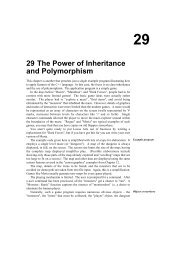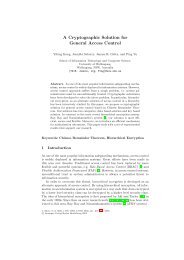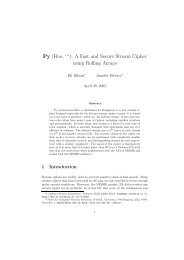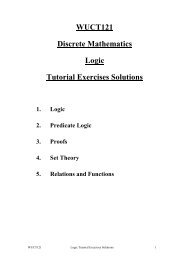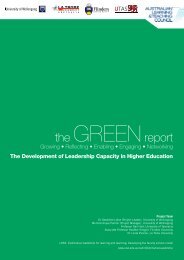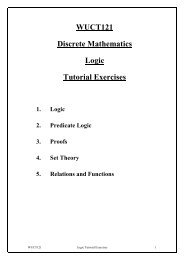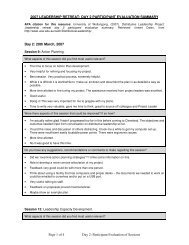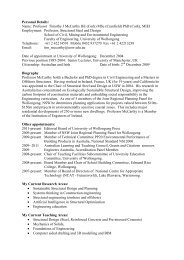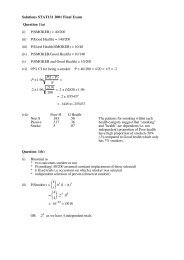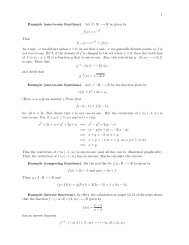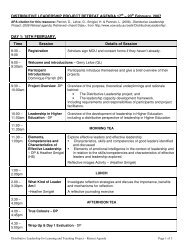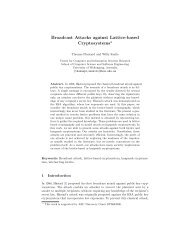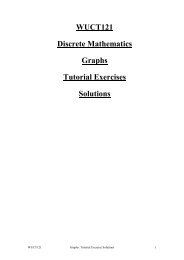india author m 1- a-nan - University of Wollongong
india author m 1- a-nan - University of Wollongong
india author m 1- a-nan - University of Wollongong
You also want an ePaper? Increase the reach of your titles
YUMPU automatically turns print PDFs into web optimized ePapers that Google loves.
BHATT, P.N. "The Impact <strong>of</strong> Gandhi on Bhabani Bhattacharya's Novels"Triveni 54.3<br />
(1985): 83-85.<br />
Traces the <strong>author</strong>’s commitment to Gandhi’s beliefs and practices. Claims Shadow<br />
from Ladakh (1966) based on Gandhian philosophy and values. Character study <strong>of</strong> Satyajit.<br />
BHATTACHARYA, BHABANI. "Women in my Stories." Journal <strong>of</strong> Indian Writing in<br />
English 3.2 (1975): 1-6.<br />
Identifies "human richness" as the key factor in his women figures. Claims women have<br />
an innate capacity for value adaptation. Traces the importance <strong>of</strong> the images <strong>of</strong> the<br />
grandmother in the short story,"Steel Hawk", and the destitute girl in So Many Hungers<br />
(1947). Moral evaluation <strong>of</strong> women characters finds more depth in them than the male<br />
characters.<br />
CHANDRASEKHARAN, K. R. Bhabani Bhattacharya New Delhi:<br />
Arnold-Heinemann, 1974, 180pp.<br />
Perceives the <strong>author</strong> advocating a synthesis <strong>of</strong> Gandhi’s asceticism and Tagore’s<br />
aestheticism producing a philosophy <strong>of</strong> compromise and reconciliation. Examines the <strong>author</strong>’s<br />
purpose in depicting truth as he see it. Focuses on the transformation <strong>of</strong> character operating<br />
within a formulation <strong>of</strong> synthesis which eventuates in equilibrium and harmony.<br />
DESAI, S.K. "Bhabani Bhattacharya: The Writer Who Rides a Tiger" in NAIK, M.K.<br />
Perspectives on Indian Fiction in English New Delhi: Abhinav Publications, 1985: 119-34.<br />
DHAR, T.N. "Bhabani Bhattacharya's He Who Rides a Tiger: The Role-Playing Matrix" in<br />
GUPTA, G.S. BALARAMA., ed. Studies in Indian Fiction in English Gulbarga: JIWE<br />
Publications, 1987: 93-103.<br />
FISHER, MARLENE. "Personal and Social change in Bhattacharya's Novels" World<br />
Literature Written in English 12 (1973):288-96.<br />
Finds Bhattacharya's oeuvre implies that inner personal growth and outer social<br />
change are inextricably interrelated and must keep pace with one another. Reveals the central<br />
motifs in his work as 1) the need for reform, 2) reconciliation <strong>of</strong> the two conflicting means to<br />
improvement, 3) removal <strong>of</strong> British imperialism is connected to radically transforming native<br />
greed and selfishness into a better India for all. Traces universalist values in his work.<br />
FISHER, MARLENE. "The Women in Bhattacharya's Novels" World Literature Written in<br />
English 11.1 (1972):95-108.<br />
The <strong>author</strong>’s representation <strong>of</strong> women stems from his linking them to the Hindu<br />
worship <strong>of</strong> the Sacred Cow, Gaumata, and to the Hindu concept <strong>of</strong> Shakti. Offers character<br />
studies <strong>of</strong> Chandra Lekha, Kajoli, Mohini, Meera and Suruchi as examples <strong>of</strong> Shakti in<br />
action. Finds his depiction <strong>of</strong> women sensitive, sympathetic and successful because they are<br />
able to take on a life <strong>of</strong> their own beyond the context <strong>of</strong> their novels.<br />
JAIN, JASBIR. "Coming to Terms with Gandhi: Shadow From Ladakh" Journal <strong>of</strong> Indian<br />
Writing in English 3.2 (1975):20-23.<br />
Considers Shadow From Ladakh (1966) as a probe <strong>of</strong> the validity and relevance <strong>of</strong><br />
Gandian ethics to postindependence India. Perceives the character <strong>of</strong> Satyajit as the<br />
representative <strong>of</strong> the form and Bhaskar, the content, <strong>of</strong> Gandhi. Gandian moral evaluation<br />
differentiates between the form and content <strong>of</strong> the guru's message.




